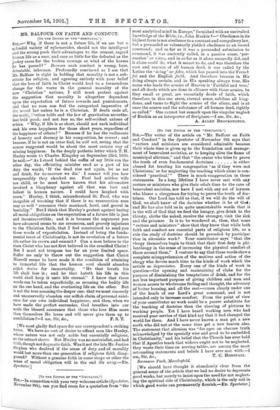MR. BALFOUR ON FAITH AND CONDUCT.
[To THR EDITOR OP TDB " SPECTATOILl
SIE,•—" Why, if there is not a future life, if we are but a splendid variety of ephemerides, should not the intelligent and the strong push their advantages to the utmost, regard human life'as a race; and care as little for the defeated as the jockey cares for the broken courage or wind of the horses lie has passed P " Because such conduct is wrong, base, detestable, inhuman. Profoundly convinced as I am that Mr. Balfour is right in holding that morality is not a sub- stitute for religion, and agreeing entirely with your belief that the loss of faith in Christ would lead to a tremendous change for the worse in the general morality of the now " Christian " nations, I still must protest against the suggestion that morality is altogether dependent upon the expectation of future rewards and punishments, and that no man can feel the categorical imperative of the moral law unless he is a Christian. If death ends all, the multii,:ii.lation table and the law of gravitation neverthe- less hold good; and not less so, the self-evident axioms of ethics. " Why, if life is so short, should not each individual seek his own happiness for those short years, regardless of the happiness of others P " Because if he has the rudiments of honesty and decency in his composition, he cannot ; and because, if he is not an utter fool, he will not, seeing that the course suggested would be about the most certain way of Missing happiness. In the deeply pathetic letter which T. H. Huxley wrote to Charles Kingsley on September 23rd, 1860, he said.:—" As I stood behind the coffin of my little son the other day, the officiating minister read as a part of his duty the words, ' If the dead rise not again, let us eat and drink, for to-morrow we die.' I cannot tell you how inexpressibly• they shocked me. Paul had neither wife nor child, or he must have known that his alternative involved a blasphemy against all that was best and holiest in human nature. I could have laughed with scorn." Huxley, I think, misunderstood St. Paul, who was incapable of teaching that if there is no resurrection men may as well " renounce their manhood, howl, and grovel in bestiality." But I think that Huxley's protest against basing all moral obligations on the expectation of a future life is just and incontrovertible; and it is because the argument you have advanced seems to me erroneous, and gravely injurious to the Christian faith, that I feel constrained to send you these words of expostulation. Instead of being the funda- mental tenet of Christianity, is not its revelation of a future life rather its crown and summit? Can a man believe in the risen Christ who has not first believed in the crucified Christ ? But I must not trespass too far on your limited space. Suffer me only to throw out the suggestion that Christ Himself seems to have made it the condition of attaining to immortal life that the human soul should abandon selfish desire for immortality. " He that loveth his life shall lose it ; and he that hateth his life in this world shall keep it unto life eternal." I know that these words can be taken superficially, as meaning the bodily life on the one hand, and the everlasting life on the other. But is not the true meaning the deeper one: that we must sincerely and unreservedly abandon our selfish claim of personal exist- ence for our own individual happiness; and then, when we have made the perfect surrender, God breathes into our souls the blessed assurance that those who love Him more than themselves He loves and will never give them up to annihilation P—I am, Sir, &c., F. S. T.
[We most gladly find space for our correspondent's striking letter. We have no sort of desire to offend men like Huxley, whose nature was not only noble but essentially religious, as the extract shows. But Huxley was no materialist, and had faith, though not dogmatic faith. Was it not the late Mr. Justice Stephen who doubted if the sense of duty and of morality would last more than one generation if religious faith disap- peared P Without a genuine faith in some shape or other the sense of moral obligation will in the end die away.—En. Spectator.]


























































 Previous page
Previous page